小学英语语法名词专题
- 格式:ppt
- 大小:3.75 MB
- 文档页数:42
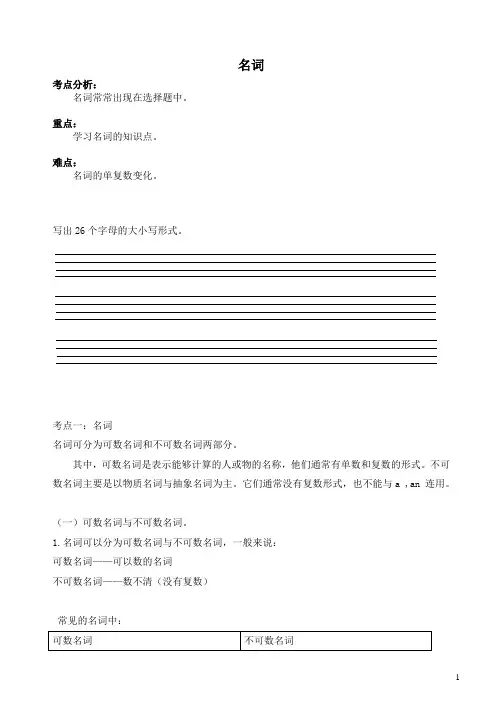
名词考点分析:名词常常出现在选择题中。
重点:学习名词的知识点。
难点:名词的单复数变化。
写出26个字母的大小写形式。
考点一:名词名词可分为可数名词和不可数名词两部分。
其中,可数名词是表示能够计算的人或物的名称,他们通常有单数和复数的形式。
不可数名词主要是以物质名词与抽象名词为主。
它们通常没有复数形式,也不能与a ,an 连用。
(一)可数名词与不可数名词。
1.名词可以分为可数名词与不可数名词,一般来说:可数名词——可以数的名词不可数名词——数不清(没有复数)常见的名词中:(二)可数名词单复数。
1、一般情况,加sbook-books, bag-bags, cat-cats, bed-beds,2、以-s, -x, -sh, -ch等结尾的词加esbus—buses, box—boxes, watch--watches3、以辅音字母加y结尾的词变y为i再加esbaby—babies, city—cities, lady—ladies4、不规则变化改变单数名词中的元音字母man—men, woman—women foot—feet, tooth—teeth5、单复数形式相同fish—fish Chinese—Chinese sheep—sheep6、其他形式mouse—mice, child—children7、以o 结尾的名词有些在词尾加-es, 他们是“英雄爱吃土豆西红柿。
如: hero—heroes, tomato—tomatoes, potato—potatoes而一般在词尾加s。
如:radio—radios(收音机)piano-pianos (钢琴) zoo-zoos(动物园) photo-photos (照片) kangaroo-kangaroos(袋鼠) kilo-kilos(千克)【课堂练习】1、写出下列各词的复数。
watch_________mango_________child_________photo_________day_________foot_________sheep_________box_________strawberry_________peach_________sandwich_________man_________woman_________dress_________tooth_________tomato________2、用所给名词的正确形式填空。
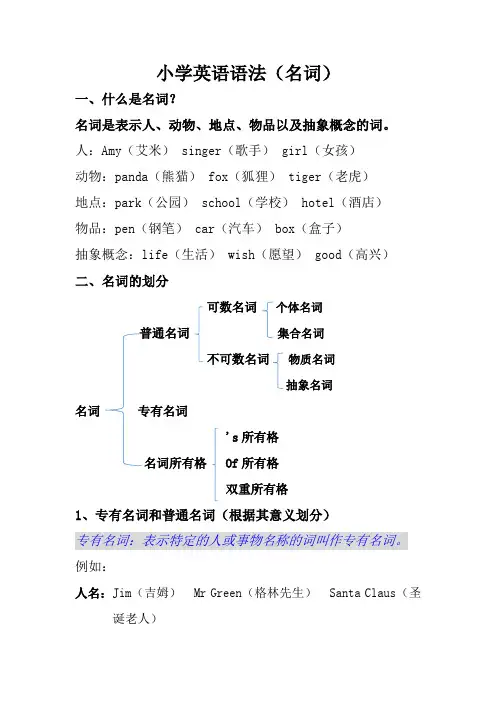
小学英语语法(名词)一、什么是名词?名词是表示人、动物、地点、物品以及抽象概念的词。
人:Amy(艾米) singer(歌手) girl(女孩)动物:panda(熊猫) fox(狐狸) tiger(老虎)地点:park(公园) school(学校) hotel(酒店)物品:pen(钢笔) car(汽车) box(盒子)抽象概念:life(生活) wish(愿望) good(高兴)二、名词的划分可数名词个体名词普通名词集合名词不可数名词物质名词抽象名词名词专有名词's所有格名词所有格 Of所有格双重所有格1、专有名词和普通名词(根据其意义划分)专有名词:表示特定的人或事物名称的词叫作专有名词。
例如:人名:Jim(吉姆) Mr Green(格林先生) Santa Claus(圣诞老人)星期、月份、节日:Sunday(星期天) May(五月) Christama(圣诞节) the Spring Festival(春节)建筑、街道:the Great Wall(长城) the Fifth Avenue(第五大道)国家、城市:China(中国) Beijing(北京) Paris(巴黎)普通名词:凡是不属于特定的人或事物名称的词,叫作普通名词。
又可分为:个体名词、集体名词、物质名词、抽象名词。
个体名词:cup(杯子) scarf(围巾) taxi(出租车)集体名词:class(班级) people(人民) team(队伍)物质名词:air(空气) milk(牛奶) water(水)抽象名词:work(工作) honesty(诚实) peace(和平)2、可数名词与不可数名词(根据是否能够用数字来计算)可数名词:可以用数字一个一个数出来的名词。
有单数和复数两种形式。
单数名词用名词原形表示。
复数名词有如下变化形式:一般情况:词尾+S词尾是S\X\SH\CH的词:词尾+es“辅音字母+y”结尾的词:变y为i,再加es部分词尾是o的词:词尾+es词尾是f或fe的词:变f或fe为v,再加es不可数名词:不可以用数字一个一个数出来的名词,叫作不可数名词。
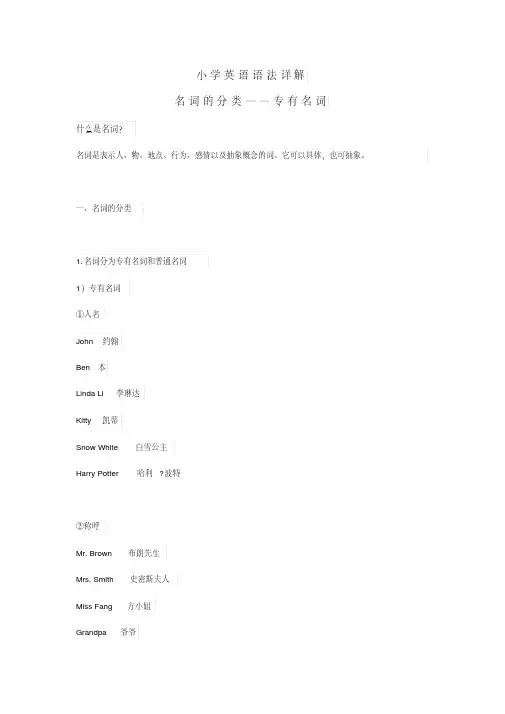
小学英语语法详解名词的分类——专有名词什么是名词?名词是表示人、物、地点、行为、感情以及抽象概念的词。
它可以具体,也可抽象。
一、名词的分类1.名词分为专有名词和普通名词1)专有名词①人名John 约翰Ben 本Linda Li 李琳达Kitty 凯蒂Snow White 白雪公主Harry Potter 哈利?波特②称呼Mr. Brown 布朗先生Mrs. Smith 史密斯夫人Miss Fang 方小姐Grandpa 爷爷③品牌Teddy Bear 泰迪熊④月份January —月February 二月March 三月⑤星期Sunday 周日Monday 周一Tuesday 周二⑥节日Christmas圣诞节Easter复活节the Children's Day 儿童节⑦建筑,公园,车站,路名the Great Wall 长城Yan'an Road 延安路the Century Park 世纪公园Zhongshan Park Station 中山公园站⑧学科,语言Maths数学Music音乐Chinese 中文⑨国家,城市China中国Nanjing 南京Australia澳大利亚Sydney悉尼学习小贴士:专有名词是表示特定的人、地方或事物的词,专有名词的第一个字母要大写!让我们一起看看下面的例子:★Mrs. White goes to the Century Park every Sunday.怀特太太每个周日都要去世纪公园。
★Kitty lives in America but she can speak Chinese.凯蒂生活在美国,但她会说中文。
从上面两句例句中,你找到多少专有名词了呢?小学英语语法详解名词的分类——普通名词什么是名词?名词是表示人、物、地点、行为、感情以及抽象概念的词。
它可以具体,也可抽象。
一、名词的分类1.名词分为专有名词和普通名词2)普通名词①个体名词:表示单个的人和事物car小轿车room房间fan电扇photo照片②集体名词:表示一群人或一些事物的名称people人们family家庭army 军队government 政府group集团③复合名词:两个或两个以上名词连在一起构成的名词。
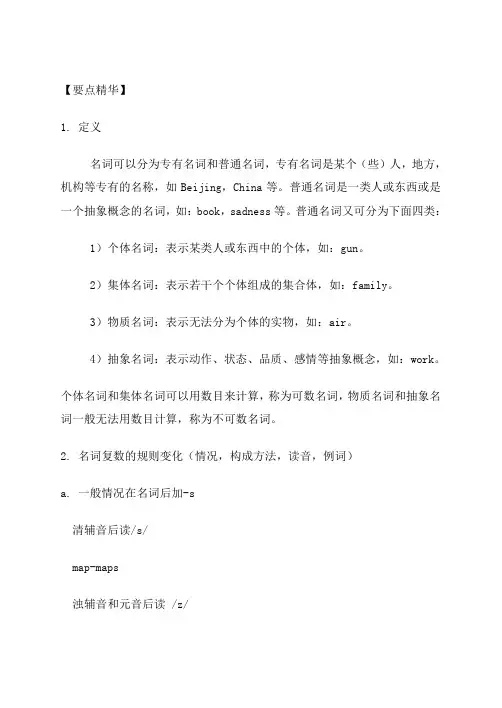
【要点精华】1. 定义名词可以分为专有名词和普通名词,专有名词是某个(些)人,地方,机构等专有的名称,如Beijing,China等。
普通名词是一类人或东西或是一个抽象概念的名词,如:book,sadness等。
普通名词又可分为下面四类:1)个体名词:表示某类人或东西中的个体,如:gun。
2)集体名词:表示若干个个体组成的集合体,如:family。
3)物质名词:表示无法分为个体的实物,如:air。
4)抽象名词:表示动作、状态、品质、感情等抽象概念,如:work。
个体名词和集体名词可以用数目来计算,称为可数名词,物质名词和抽象名词一般无法用数目计算,称为不可数名词。
2. 名词复数的规则变化(情况,构成方法,读音,例词)a. 一般情况在名词后加-s清辅音后读/s/map-maps浊辅音和元音后读 /z/bag-bags /car-carsb. 以s, sh, ch, x等结尾的名词加-es读 /iz/bus-buses/ watch-watches/brush-brushes/box-boxesc. 以ce, se, ze,等结尾加 -s读 /iz/license-licensesd. 以辅音字母+y结尾的名词把变y 为i再加es读 /z/baby---babiese. 以o 结尾的名词,变复数时:1). 加s,如: photo---photos piano---pianosradio---radios zoo---zoos;2). 加es,如:potato--potatoes tomato--tomatoes3). 上述a和b两种方法均可,如zero---zeros / zeroes。
f. 以f或fe 结尾的名词变复数时:1). 加s,如: belief---beliefs roof---roofssafe---safes gulf---gulfs2). 去f, fe 加ves,如:half---halvesknife---knives leaf---leaves wolf---wolveswife---wives life---lives thief---thieves3). 上述a和b两种方法均可,如handkerchief: handkerchiefs / handkerchieves。
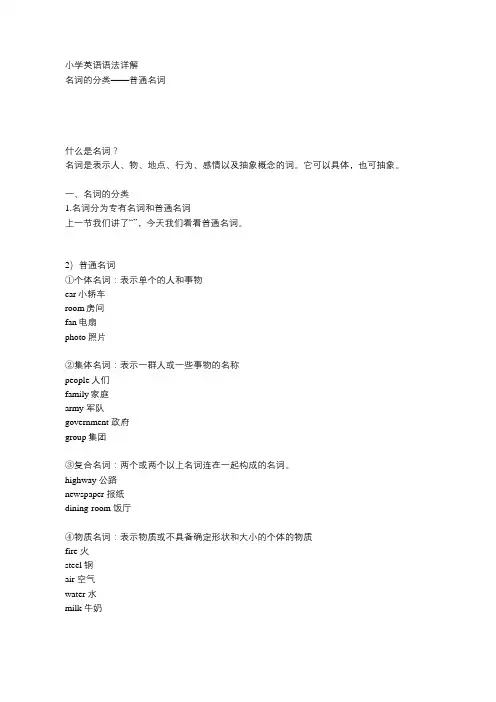
小学英语语法详解名词的分类——普通名词什么是名词?名词是表示人、物、地点、行为、感情以及抽象概念的词。
它可以具体,也可抽象。
一、名词的分类1.名词分为专有名词和普通名词上一节我们讲了“”,今天我们看看普通名词。
2)普通名词①个体名词:表示单个的人和事物car小轿车room房间fan电扇photo照片②集体名词:表示一群人或一些事物的名称people人们family家庭army 军队government 政府group集团③复合名词:两个或两个以上名词连在一起构成的名词。
highway 公路newspaper 报纸dining-room 饭厅④物质名词:表示物质或不具备确定形状和大小的个体的物质fire 火steel 钢air 空气water 水milk 牛奶⑤抽象名词:表示动作,状态,品质或其他抽象概念labor 劳动health 健康life 生活friendship 友情patience 耐力学习小贴士:普通名词是表示一类人、事物或者抽象概念的词。
在普通名词之前可以加上冠词a/an/the也可以不加冠词,普通名词的前面也可以加上一些形容词来修饰。
其实在我们日常使用中,普通名词占了绝大多数呢!★ I like juice very much.我非常喜欢果汁。
★ How many pupils are there in your class?你们班上有多少学生?★ Linda has a beautiful dress.琳达有一件漂亮的裙子。
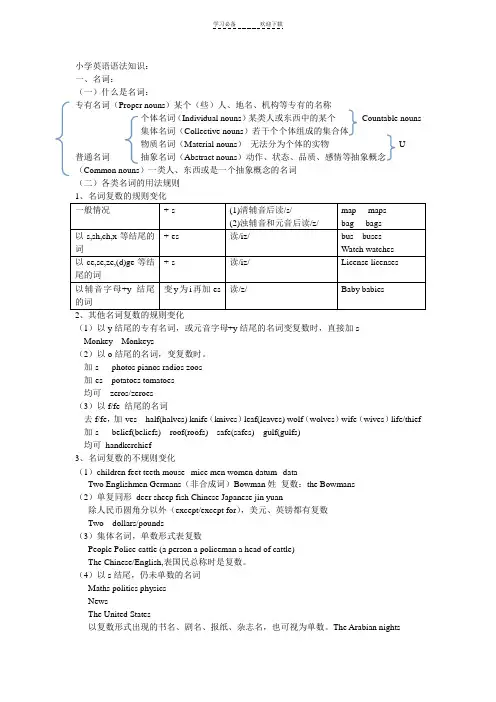
小学英语语法知识:一、名词:(一)什么是名词:专有名词(Proper nouns)某个(些)人、地名、机构等专有的名称个体名词(Individual nouns)某类人或东西中的某个Countable nouns集体名词(Collective nouns)若干个个体组成的集合体物质名词(Material nouns)无法分为个体的实物U普通名词抽象名词(Abstract nouns)动作、状态、品质、感情等抽象概念(Common nouns)一类人、东西或是一个抽象概念的名词(二)各类名词的用法规则1、名词复数的规则变化一般情况+-s (1)清辅音后读/s/(2)浊辅音和元音后读/z/ map----maps bag----bags以s,sh,ch,x等结尾的词+-es 读/iz/ bus busesWatch watches以ce,se,ze,(d)ge等结尾的词+-s 读/iz/ License licenses以辅音字母+y结尾的词变y为i再加-es 读/z/ Baby babies2、其他名词复数的规则变化(1)以y结尾的专有名词,或元音字母+y结尾的名词变复数时,直接加sMonkey---Monkeys(2)以o结尾的名词,变复数时。
加-s photos pianos radios zoos加-es potatoes tomatoes均可zeros/zeroes(3)以f/fe 结尾的名词去f/fe,加-ves half(halves) knife(knives)leaf(leaves) wolf(wolves)wife(wives)life/thief 加-s belief(beliefs) roof(roofs) safe(safes) gulf(gulfs)均可handkerchief3、名词复数的不规则变化(1)children feet teeth mouse--mice men women datum--dataTwo Englishmen Germans(非合成词)Bowman姓复数:the Bowmans(2)单复同形deer sheep fish Chinese Japanese jin yuan除人民币圆角分以外(except/except for),美元、英镑都有复数Two dollars/pounds(3)集体名词,单数形式表复数People Police cattle (a person a policeman a head of cattle)The Chinese/English,表国民总称时是复数。
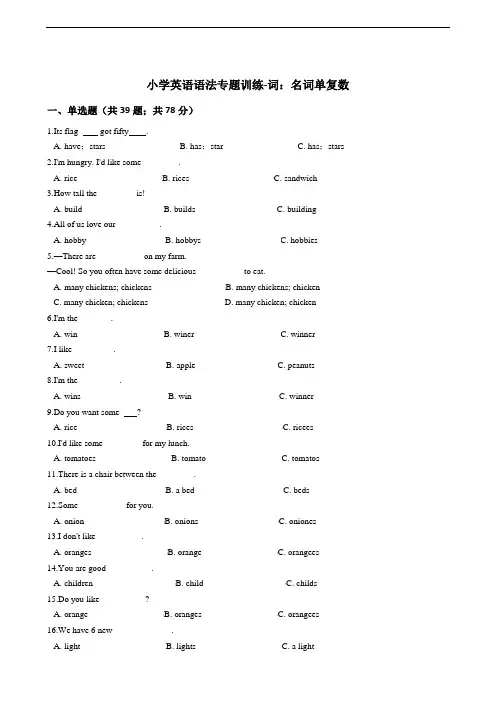
小学英语语法专题训练-词:名词单复数一、单选题(共39题;共78分)1.Its flag got fifty .A. have;starsB. has;starC. has;stars2.I'm hungry. I'd like some ________.A. riceB. ricesC. sandwich3.How tall the ________ is!A. buildB. buildsC. building4.All of us love our__________.A. hobbyB. hobbysC. hobbies5.—There are __________ on my farm.—Cool! So you often have some delicious __________ to eat.A. many chickens; chickensB. many chickens; chickenC. many chicken; chickensD. many chicken; chicken6.I'm the _______.A. winB. winerC. winner7.I like _________.A. sweetB. appleC. peanuts8.I'm the _________.A. winsB. winC. winner9.Do you want some ?A. riceB. ricesC. ricees10.I'd like some ________ for my lunch.A. tomatoesB. tomatoC. tomatos11.There is a chair between the ________.A. bedB. a bedC. beds12.Some __________ for you.A. onionB. onionsC. oniones13.I don't like __________.A. orangesB. orangeC. orangees14.You are good __________.A. childrenB. childC. childs15.Do you like __________?A. orangeB. orangesC. orangees16.We have 6 new _____________.17.— What's that?— It's a _____.A. deskB. downC. black18.— How _______________ is it?— Ten _______________.A. many; dollarB. many; dollarsC. much; dollarD. much; dollars19.Point to the ______.A. IB. hiC. desk20.—What do you want, Mum?—I want a new ________.A. dressB. skirtsC. shorts21.I have a ________, but I don't have any ________.A. sister; brotherB. brothers; sisterC. brother; cousins22.Two fat ________are in the rain.A. boyB. girlC. boys23.This is my________.A. girlsB. eyesC. nose24.Here______________ your______________.A. be; sandwichB. is; sandwichesC. are; sandwichD. are; sandwiches25.They eat______________ twelve______________ a day!A. of; hoursB. of; hourC. for; hoursD. for; hour26.There are lots of______________ and______________ in Guilin.A. mountains; lakeB. mountain; lakesC. mountain; lakeD. mountains; lakes27.Eating __________________ food is good for yourA. health; healthyB. health; healthC. healthy; healthD. healthy; healthy28.— There's a lot of __________________ in his room. Who __________________ here?— Sorry, I don't know.A. smoke; smokesB. smokes; smokeC. smoke; smokedD. smokes; smokes29.We sell books and______________.A. fishB. fishsC. clothe30.She is 1.3 tall.A. metresB. metreC. meter31.How many are there?A. bookB. booksC. a book32.He is a basketball .A. playB. to playC. player33.They're my grandpa's _____________.A. dogsB. a dogC. dogA. teachersB. teachers'C. teacher35.He lost his arms six years ago.So he writes with his right .A. handB. handsC. footD. feet36.It's fourteen dollars and five _________.A. centB. centsC. centes37.He spent about twenty-one ________ in spaceA. hourB. timeC. hours38.I'm going to watch TV _______.A. tonightB. in tonightC. at tonight39.I am sending some ______________.A. photoesB. photosC. photo二、判断题(共4题;共8分)40.So many bottles.41.Hi, boys and girl.42.They are teacher.43.They have many cow.三、选词填空(词汇运用)(共4题;共4分)44.We have fish ________ (sandwich/sandwiches) today.45.We took________ (photos/ photoes) of the Great Wall.46.This is my________ (brother/black).47.She spent about three ________ (hours/hour) doing her homework.四、语法填空(共2题;共2分)48.We have beef noodles and fish ________ (sandwich) today.49.It's one ________ (dollar) and five cents.五、单词拼写(词汇运用)(共1题;共18分)50.按要求完成下列各词(1)don't (全写形式) ________(2)story(复数)________(3)tall(反义词)(4)foot(复数) ________(5)they(形物)(6)sun(形容词)________(7)three (序数词)________(8)five(序数词)________(9)what's(全写形式)________(10)have(单三)________答案解析部分一、单选题1.【答案】C【考点】可数名词,固定搭配【解析】【分析】句意:它的旗帜上有五十颗星。
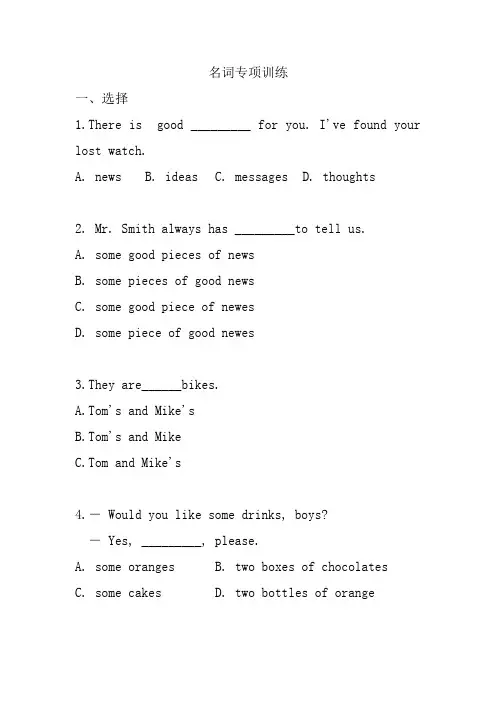
名词专项训练一、选择1.There is good _________ for you. I've found your lost watch.A. newsB. ideasC. messagesD. thoughts2. Mr. Smith always has _________to tell us.A. some good pieces of newsB. some pieces of good newsC. some good piece of newesD. some piece of good newes3.They are______bikes.A.Tom's and Mike'sB.Tom's and MikeC.Tom and Mike's4.― Would you like some drinks, boys?― Yes, _________, please.A. some orangesB. two boxes of chocolatesC. some cakesD. two bottles of orange5.At night the koala bear gets up and eats ___________.A. leafB. leavesC. leafs6.The PLA man saved three _________ lives in the accident.A. children’sB. childrenC. childD. childs'7. My uncle will come to my house for dinner. I want to buy some _________ to make a vegetable salad for him.A. meatB. tomatoesC. apple juicee on, children. Help yourselves to some _________ if you like.A. fish and chickenB. fishes and chickenC. fish and chickensD. fishes and chickens9.The teacher said we needed to choose three _________ for the school concert.A. farmersB. doctorsC. driversD. singers10.All the _________ teachers enjoyed themselves on March 8th,because it was their own holiday.A. manB. menC. womanD. women11.There is no____on the plate.A. applesB. bananasC. rice12.There's a_______near our school. We often buy books there.A. libraryB. shopC. bookstore13.Robin Hood is a great_____in ________.A.hero;EnglandB.writer;EnglandC.hero; America14.—Would you like some_______for dinner?—Yes, please!A. potatosB.potatoesC. potato二、看图,根据句意和首字母提示填单词。
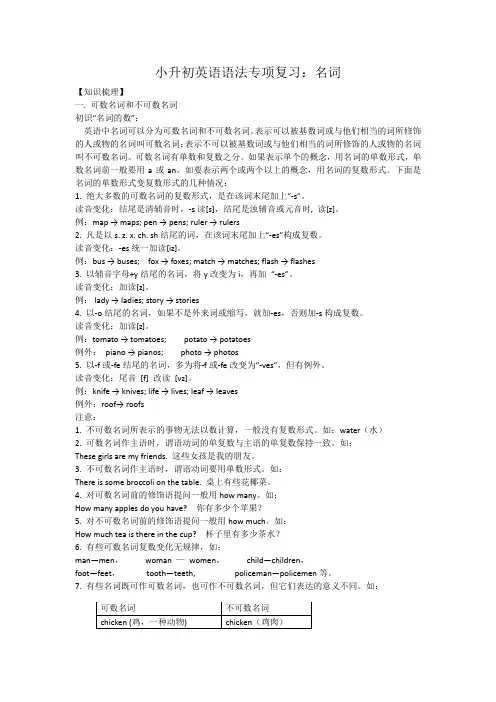
小升初英语语法专项复习:名词【知识梳理】一. 可数名词和不可数名词初识“名词的数”:英语中名词可以分为可数名词和不可数名词。
表示可以被基数词或与他们相当的词所修饰的人或物的名词叫可数名词;表示不可以被基数词或与他们相当的词所修饰的人或物的名词叫不可数名词。
可数名词有单数和复数之分。
如果表示单个的概念,用名词的单数形式,单数名词前一般要用a或an。
如要表示两个或两个以上的概念,用名词的复数形式。
下面是名词的单数形式变复数形式的几种情况:1. 绝大多数的可数名词的复数形式,是在该词末尾加上“-s”。
读音变化:结尾是清辅音时,-s读[s],结尾是浊辅音或元音时, 读[z]。
例:map → maps;pen → pens;ruler → rulers2. 凡是以s. z. x. ch. sh结尾的词,在该词末尾加上“-es”构成复数。
读音变化:-es统一加读[iz]。
例:bus → buses;fox → foxes;match → matches;flash → flashes3. 以辅音字母+y结尾的名词,将y改变为i,再加“-es”。
读音变化:加读[z]。
例:lady → ladies;story → stories4. 以-o结尾的名词,如果不是外来词或缩写,就加-es,否则加-s构成复数。
读音变化:加读[z]。
例:tomato → tomatoes; potato → potatoes例外:piano → pianos; photo → photos5. 以-f或-fe结尾的名词,多为将-f或-fe改变为“-ves”,但有例外。
读音变化:尾音[f] 改读[vz]。
例:knife → knives;life → lives;leaf → leaves例外:roof→ roofs注意:1. 不可数名词所表示的事物无法以数计算,一般没有复数形式。
如:water(水)2. 可数名词作主语时,谓语动词的单复数与主语的单复数保持一致。

小学英语语法:名词 HEN system office room 【HEN16H-HENS2AHENS8Q8-HENH1688】小学英语语法:名词一.名词的定义:1.名词分为专有名词和普通名词。
专有名词是表示具体的人、事物、地点、或机构等的专有名称。
如:GuangZhou,Mike,UNESCO等。
专有名词一般情况下第一个字母要大写,前面不加定冠词the。
普通名词是表示一类人、事物或抽象概念的名称。
如:police,eggs,rice等。
普通名词又可分为个体名词、集体名词、物质名词和抽象名词。
个体名词:表示某一类人或某一类东西中的个体。
如:monkey,panda,ruler,boy等。
集体名词:表示一群人或一些事物的总称。
如:family,police,class,people等。
物质名词:表示无法分为个体或不具备确定形状和大小的实物。
如:Water,air,milk等。
抽象名词:表示抽象概念词。
如:hope,love,spirit。
二.可数名词和不可数名词:1.定义:一般来说,个体名词和集体名词多为可数名词,物质名词和抽象名词多为不可数名词。
2.可数名词的数:可数名词有单数、复数之分,表示“一个”时用单数,a bird,a teacher,an apple,表示“多个”时用复数。
two birds,five teachers,eight apples3.可数名词复数的变化规则口诀:名词单数变复数,直接加 -s 占多数;s, x, z, ch, sh 来结尾,直接加上 -es;词尾是 f 或 fe,加 -s 之前先变 ve;辅母 + y 在词尾,把 y 变 i 再加 -es;词尾字母若是 o,常用四个已足够,要加 -es 请记好,黑人英雄吃土豆西红柿. A、一般情况下,在单数名词的后面加-s构成。
如:game-games,boy-boys等。
B、以s、x、sh、ch结尾的单数名词变复数,在词尾加-es构成。
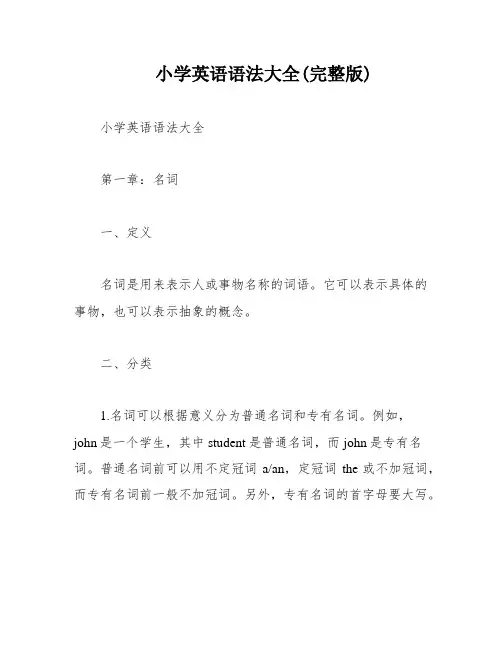
小学英语语法大全(完整版)小学英语语法大全第一章:名词一、定义名词是用来表示人或事物名称的词语。
它可以表示具体的事物,也可以表示抽象的概念。
二、分类1.名词可以根据意义分为普通名词和专有名词。
例如,john是一个学生,其中student是普通名词,而john是专有名词。
普通名词前可以用不定冠词a/an,定冠词the或不加冠词,而专有名词前一般不加冠词。
另外,专有名词的首字母要大写。
2.普通名词又可以分为个体名词、集体名词、物质名词和抽象名词。
其中,个体名词和集体名词是可数名词,而物质名词和抽象名词是不可数名词。
3.专有名词专有名词是用来表示人名、地名、团体、机构、组织等的专有名词,多数情况下是独一无二的。
三、名词的数1、名词可以分为可数名词和不可数名词。
可数名词——可以数的名词不可数名词——数不清(没有复数形式)例如:drink(饮料)、milk(牛奶)、tea(茶)、water (水)、orange juice(橙汁)、coke(可乐)、coffee(咖啡)、porridge(粥)、food(食物)、rice(米饭)、bread(面包)、meat(肉类)、fish(鱼)、fruit(水果)、cake (蛋糕)、dumplings(饺子)2、可数名词可以与不定冠词a/an连用,有复数形式。
而不可数名词不能与不定冠词连用,也没有复数形式。
在修饰可数名词时,可以直接使用数词。
而在修饰不可数名词时,需要使用量词。
例如:many+可数名词复数;不可数名词用much/alittle+some/any/a lot of3、不可数名词的数量可以用以下两种方式表示:第一种方式是使用等量词,例如:some、much、a little、a lot of、a bit of、plenty of等。
注意,有些词既可以与可数名词复数连用,也可以与不可数名词连用,例如:plenty of、some、a lot of、lots of、等等。
小学英语语法专题:可数名词与不可数名词一、可数名词与不可数名词的区别普通名词所表示的人或事物是可以按个数计算的,这类名词叫可数名词。
可数名词分为个体名词(表示某类人或事物中的个体,如worker, farmer, desk, factory等)和集体名词(表示作为一个整体来看的一群人或一些事物,如people,family 等)。
如果普通名词所表示的事物是不能按个数来计算的,这类名词就叫不可数名词。
不可数名词分为物质名词(表示无法分为个体的物质,如meat, rice,water, milk, orange 等)和抽象名词(表示动作、状态、情况、品质等抽象概念,如work, homework, time, health,friendship等)。
二、关于可数名词可数名词有单数和复数两种形式。
指一个人或一件事物时,用单数形式;指两个或多个人或事物时用复数形式。
名词由单数形式变成复数形式的规则如下:1. 一般的名词词尾直接加-s 。
如:book books room roomshouse houses day days2. 以s,ss, ch,sh, x 结尾的名词,在词尾加-es 。
如:bus buses glass glasseswatch watchesdish dishes box boxes3. 以辅音字母+y结尾的名词,要先将y改为i再加-es。
如:city cities body bodiesfactory factories等等。
4. 以f 或fe 结尾的名词,要将f或fe改为v再加-es。
如:half halves leaf leavesknife knives wife wives5. 特例 [特例常常考,要记住。
]① child children② man men woman womenpoliceman policemen(规律:man men)③ tomato tomatoespotato potatoes[特别备注:初中英语以o 结尾的名词变复数时只有这两个词加-es,其余的当然加-s喽!如:photo photos ]④ foot feet tooth teeth[特别备注: oo变成ee。
小学英语语法专题:名词所有格一、名词词尾加s的所有格1. 一般情况在名词后加s例如:That girls coat is in the room. 那个女孩的衣服在房间里。
2. 在以s结尾的名词(包括以s结尾的复数名词)后面,只加。
如果复数名词不是以s结尾的,末尾也要加s。
例如:Today is September 10th, Teachers Day. 今天是九月十日,教师节。
Childrens Day is coming, I should buy something new for my son. 儿童节马上就要到了,我应该为我的儿子买一些新东西。
3. 表示词组内的并列名词各自的所有关系时,须在各个名词后加s;如果一个东西为两个人或者两个以上的人共同拥有,只在最后一个名词后面加s。
例如:They are Johns and Kates rooms. How beautiful they are!这是约翰和凯特的房间。
它们(指房间)太漂亮了!He is Lily and Lucys father. 他是莉莉和露西的爸爸。
4. 表示某人的家、店铺等的所有格,一般可以省略它后面所修饰的名词。
例如:My father and I will have dinner at the Johnsons (home )。
我爸爸和我将要去约翰逊的家吃晚饭。
We will have our hair cut at the barbers(shop)tomorrow afternoon. 明天下午我们要去理发店理发。
5. 有些指时间、距离、国家、城镇等的名词,也可以加s构成所有格。
例如:There is something important in todays newspaper. 今天的报纸上有一些重要的东西。
Its about ten minutes walk from school to our home every day. 每天从学校到我们家步行大约需要十分钟。
Contents第一章名词1.名词的数2.名词的格第二章代词1.人称代词2.物主代词第三章冠词与数词1.冠词2.数词第四章一般现在时态第五章现在进行时态第六章句型1.陈述句2.疑问句3.祈使句4.There be 句型与have\ has第七章总结考试第一章名词(Noun)名词的概念在生活中,我们会接触到各种各样的人和事物,用来表示这些人或事物名称的词就是名词。
一、名词的数名词的数指名词的单数和复数形式。
可数名词表示“一个”时用单数,“两个以上”时用复数;不可数名词表示量时,通常用“数词+单位+of+物质名词”的形式,如 a piece of bread (一片面包),变为复数时,只须将单位名词变为复数,如:two pieces of bread(两片面包)。
*名词复数的构成法则1. 一般情况下在词尾加 s. 词尾读音shop --- shops (商店) 在清辅音后读[ s ]bag --- bags (书包) 在浊辅音后读[ z ]window --- windows (窗户) 在元音后读[ z ]2. 以s, x, sh, ch 结尾的单词在词尾加es。
class --- classes (班级) 词尾读音[ iz ]box --- boxes (盒子)match --- matches (比赛)brush --- brushes (刷子)3. 以“辅音字母+y”结尾的词,变y为i 加es.story --- stories (故事) 词尾读音[ iz ]4. 以“元音字母+y”结尾的词,在词尾直接加skey --- keys 词尾读音[ z ]monkey --- monkeys5.以“o”结尾的名词,复数一般在词尾加“s”, 但个别加“es”tomato --- tomatoes (西红柿) 词尾读音[ z ]potato --- potatoes (土豆)zoo --- zoos (动物园)photo --- photos (照片)*(以“o”结尾,复数加“es”)口诀:黑人(Negro)英雄(hero),左手拿着西红柿(tomato),右手拿着破土豆(potato),头顶一个大芒果(mango)。
小学英语语法专题训练:名词所有格一、单选题(共50题)1.My ________ is ken.A. nameB. name'sC. /2.This is swimsuit.A. DamingB. Daming'sC. Damings3.This is ______ swimsuit.A. LilyB. Lily'sC. Lilys4.This room is .A. Ann and Amy'sB. Ann's and Amy'sC. Ann and Amy5.This is classroom.A. Peter and Tony'sB. Peter's and Tony'sC. Peter's and Tony6.— Is that room?— Yes, it's theirs.A. Jim and Bob'sB. Jim's and Bob'sC. Jim and Bob7.—________ you wash ________ shorts?—No, I didn't.A. Did; SamB. Did; Sam'sC. Do; Sam's8.There is a map ________ China on the wall.A. ofB. withC. in9.Is it ruler?A. Amy'sB. AmysC. Amys'10.This is my cake.A. dadB. dads'C. dad's11.Is this dog?A. SamsB. Sam'sC. Sams'12.It's a picture______________ the moon.A. ofB. forC. toD. in13.This is the____________ house.A. catB. cat'C. cat's14.Look at these______________ hats.A. childrens'B. children'sC. childrens15.Yesterday, I went to______________ school.A. Sam and AmyB. Sam's and AmyC. Sam's and Amy'sD. Sam and Amy's16.Is that the ______________ office?A. teachersB. teachers'sC. teachers'17.— Whose key is this?— It's __________________ key.A. AnnB. Anns'C. Ann's18.Excuse me, where is the ___________________ office?A. teacher'sB. teachers'C. teachers19.—Are those _______ books?—No, they aren't.A. teacher'sB. teachersC. teacher20.That's ___________ dress.A. Kitty'sB. KittyC. Kittys21.These are _______ desks.A. Ray or Lucy'sB. Ray's and LucyC. Ray's and Lucy'sD. Ray and Lucy22.They are photos ______ China.A. toB. ofC. inD. on23._______ grandpa is a farmer?A. ShandongB. Yang MingC. Sally's24.It is my phone number.A. motherB. mothersC. mother's25.—Are those _______ books?—No, they aren't.A. teacher'sB. teachersC. teacher26.The men wore _____________ clothes.A. womansB. womens'C. women'sD. womans'27.I have the horns a deer.A. ofB. inC. at28.Is this your ____________________ football?A. brotherB. father'sC. mother29.This is my book. That book is _______________.A. LucyB. Lucy'sC. Tom30.These pencils are ________________.A. KateB. Peter'sC. Sue31.— _______________ clothes are these?— They are _______________.A. What; PeterB. Whose; Sam'sC. Why; Jim's32.— Whose cap is it?— It is _________________.A. LucyB. myC. Mike's33.— Whose room is this?— Maybe it is _________________.A. Sam's and SallyB. Matt and Mark'sC. Matt's and Mark's34.— radio is this?—It is .A. Which; BookyB. Whose; Booky'sC. What; Booky35.That is _________grandfather.A. Tom and PeterB. Tom's and Peter'sC. Tom and Peter's36.Go to the ______ office. Hand in your homework.A. teachersB. teacher'sC. teacher37.I'm drawing a picture ________________ flowers.A. ofB. for38.It's _______ piano.A. Joe'sB. JoeC. Joes39.Tomorrow is Daming's birthday. I'm making _________ birthday card.A. DamingsB. DamingC. Daming's40.Grandparents are ________________ parents.A. mother's and father'sB. my friend'sC. my cousin's41.—What's your _______job?—_______ a cook.A. mother; She's.B. brother's; He's.C. mothers; She's42.Look at the books. They're my _______________ books.A. brotherB. brothersC. brother's43.He is ___________________ art teacher.A. TomsB. TomC. Tom's44.This is ________________ ball.A. Sam'sB. SamC. he45.This is _________ room.A. PeterB. Peter'sC. Peters46.That's ____________ umbrella. So nice!A. LucyB. Lucy isC. Lucy's47.— _____________ shirt is this?— It's _____________.A. Who, StevenB. Whose, StevensC. Whose, Steven's48.What's ______ hobby?A. you motherB. your mother'sC. your mother49.—When's _________ birthday?—It's May 5th.A. your mother'sB. his fathersC. her sister50.I like the ________ shows.A. childB. childrenC. children's答案解析部分一、单选题1.【答案】A【考点】可数名词,名词所有格(of、's),物主代词【解析】【分析】句意:我的……叫肯。
小学英语语法--名词单数名词是英语语法的基本部分之一。
在本文档中,我们将介绍名词单数的用法和一些相关的规则。
1. 名词单数的形式名词单数是指只表示一个人、动物、事物或概念的名词。
- 一般情况下,在名词的末尾加上"s"来表示单数形式,例如:book(书)→ books(书,复数)。
- 以“s”、"sh"、"ch"、"x"或"z"结尾的名词,直接在末尾加上"es"来表示单数形式,例如:bus(公交车)→ buses(公交车,复数)。
- 以辅音字母+y结尾的名词,将"y"变成"i",再加上"es"来表示单数形式,例如:baby(婴儿)→ babies(婴儿,复数)。
2. 名词单数的用法名词单数用来表示一个人、动物、事物或概念的单个实例。
- 用于描述单个物品或概念,例如:a chair(一把椅子)、an apple(一个苹果)。
- 用于描述单个人或动物,例如:a girl(一个女孩)、a dog (一只狗)。
- 用于描述特定的职业或身份,例如:a doctor(一名医生)、an engineer(一名工程师)。
3. 名词单数的一些其他规则- 表示具体的某个时间、地点或数量时,名词单数可以与其他词汇连用,例如:one book(一本书)、this apple(这个苹果)。
- 名词单数可以与形容词连用来修饰或描述,例如:a big house (一座大房子)、an interesting story(一个有趣的故事)。
- 名词单数可以与动词连用构成主语和谓语,例如:The cat runs.(这只猫跑。
)以上是关于名词单数的基本用法和规则。
希望对你的学习有所帮助!。